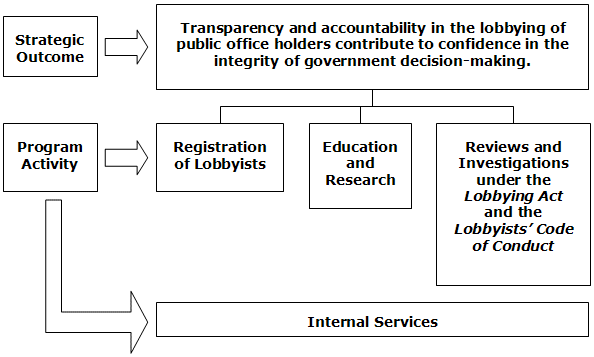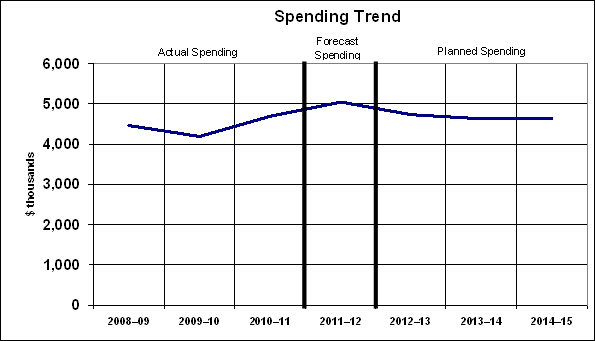Common menu bar links
Breadcrumb Trail
ARCHIVED - Office of the Commissioner of Lobbying of Canada - Report
 This page has been archived.
This page has been archived.
Archived Content
Information identified as archived on the Web is for reference, research or recordkeeping purposes. It has not been altered or updated after the date of archiving. Web pages that are archived on the Web are not subject to the Government of Canada Web Standards. As per the Communications Policy of the Government of Canada, you can request alternate formats on the "Contact Us" page.
Message from the Commissioner of Lobbying

I am pleased to present the 2012-13 Report on Plans and Priorities for the Office of the Commissioner of Lobbying. My mandate is threefold: establish and maintain a public registry for lobbyists to disclose their activities; educate lobbyists, their clients, and public office holders about the Lobbying Act and its requirements; and ensure compliance with the Lobbying Act and the Lobbyists' Code of Conduct.
The Lobbying Act is based on the premise that lobbying is legitimate, but that it must be conducted in a transparent manner. The Registry of Lobbyists is the primary instrument for public disclosure of lobbying activities. As such, my Office strives to make the system easier to use and more dependable, both for lobbyists to report on their activities and for Canadians to search for this information. In the past year, I surveyed and consulted key stakeholders to identify ways to improve the search function of the Registry. This work will be completed in 2012-13.
Better awareness and understanding of the Act helps not only lobbyists, but also their clients and public office holders, build a culture that leads to compliance. Awareness of the Lobbying Act is essential to ensuring that lobbyists understand when registration is required. As a result, I believe they are more likely to comply with the legislation. I intend to continue to reach out to all key stakeholders.
I will continue to deal with all alleged breaches of the Lobbying Act and the Lobbyists' Code of Conduct in a serious manner. In 2011-12, I tabled five Reports on Investigation in Parliament, dealing with breaches to the Lobbyists' Code of Conduct. I intend to process files as efficiently as possible, keeping pace with a growing caseload, in order to be able to table Reports on Investigations in a timely manner.
As Commissioner, I remain committed to supporting the objectives set out by Parliament through the Lobbying Act. I believe that the effective administration of this key piece of legislation has contributed to increased transparency and accountability in the lobbying of federal public office holders. In the coming year, I will support the work of Parliament, as it continues the work that began in 2011-12, to review the Lobbying Act.
Karen E. Shepherd
Commissioner of Lobbying
Section I — Organizational Overview
Raison d’être
The Office of the Commissioner of Lobbying (OCL) supports the Commissioner of Lobbying, the Agent of Parliament responsible for the administration of the Lobbying Act (the Act). The legislation seeks to improve transparency and accountability regarding communications between lobbyists and federal public office holders and increase the confidence of Canadians in the integrity of government decision-making.
Responsibilities
The Commissioner of Lobbying is responsible for the administration of the Lobbying Act. The authority of the Commissioner is derived from the Act.
The mandate of the Commissioner is threefold:
- Establish and maintain the Registry of Lobbyists, which contains and makes public the registration information disclosed by lobbyists;
- Develop and implement educational programs to foster public awareness of the requirements of the Act; and
- Undertake administrative reviews and investigations to ensure compliance with the Act and the Lobbyists' Code of Conduct (the Code).
Under the Act, the Commissioner of Lobbying also has the authority to grant exemptions to former designated public office holders who are subject to a five-year prohibition on lobbying activities.
The Commissioner reports annually to Parliament on the administration of the Act and the Code. The Commissioner is also required to table to Parliament Reports on Investigations, which include her findings, conclusions and the reasons for her conclusions.
Strategic Outcome
In order to effectively pursue its mandate, the OCL aims to achieve the following strategic outcome:
Transparency and accountability in the lobbying of public office holders contribute to confidence in the integrity of government decision-making.
Program Activity Architecture
The Program Activity Architecture (PAA) for the OCL is its basis for reporting to Parliament. The PAA reflects how the OCL allocates and manages the resources under its control to achieve its intended outcome.

Organizational Priorities
| Priority | Type | Program Activity |
|---|---|---|
| Improve the search and reporting functions of the Registry. | Ongoing | Registration of Lobbyists |
| Description | ||
|
Why is this a priority?
Plans for meeting the priority
|
||
| Priority | Type | Program Activity |
|---|---|---|
| Clarify objectives, roles and procedures in support of more effective education and outreach activities; and improve outreach to key stakeholders in a more efficient manner. | Ongoing | Education and Research |
| Description | ||
|
Why is this a priority?
Plans for meeting the priority
|
||
| Priority | Type | Program Activity |
|---|---|---|
| Improve the management of review and investigation cases based on clear criteria and priority in order to facilitate workload planning and file processing. | Ongoing | Reviews and Investigations under the Lobbying Act and the Lobbyists' Code of Conduct |
| Description | ||
|
Why is this a priority?
Plans for meeting the priority
|
||
| Priority | Type | Program Activity |
|---|---|---|
| Improve the information technology infrastructure to support the planning and management of the Directorate's caseload and the protection of files. | Ongoing | Reviews and Investigations under the Lobbying Act and the Lobbyists' Code of Conduct |
| Description | ||
|
Why is this a priority?
Plans for meeting the priority
|
||
| Priority | Type | Strategic Outcome and/or Program Activity |
|---|---|---|
| Continue strengthening the OCL management accountability framework with a view to positioning the organization to further improve priority-setting and allow the OCL to better communicate its performance story to Parliament and Canadians. | Ongoing | Internal Services |
| Description | ||
|
Why is this a priority?
Plans for meeting the priority
|
||
Risk Analysis
The Office of the Commissioner of Lobbying (OCL) has established and maintains the federal registry of lobbyists and lobbying activities known as the Lobbyists Registration System (LRS). The OCL shares the challenges of any office charged with maintaining a large-scale registry in terms of accuracy and timeliness of disclosure while ensuring registrant compliance and system integrity. The LRS is a very complex system which continually requires monitoring, maintenance and improvements to ensure it remains accessible to users and the information it contains is accurate.
The OCL strives to ensure that the LRS is continually accessible to registrants so that the goal of transparency of lobbying activities can be achieved. Therefore, the OCL minimizes registration delays by preventing system interruptions. To this end, the Registry has a number of built-in failsafe mechanisms. In the unlikely event that the Registry does shut down, either intentionally or otherwise, the OCL has processes and systems in place to limit the amount of downtime to a minimum.
The Act requires that registrants disclose certain communications involving "designated" public office holders, e.g. ministers, ministerial staff, deputy ministers, Members of Parliament and Senators. This reporting requirement is satisfied online by registrants directly inputting the data. As a result, reporting errors may occur. The OCL continues to educate lobbyists and designated public office holders regularly on how to reduce reporting errors. The OCL monitors the overall accuracy of monthly communication reports through regular sampling. It also developed a system functionality that allows external users to amend incorrect monthly communication reports without the need for OCL involvement, thus freeing up resources for other priorities.
The OCL conducts administrative reviews and investigations to ensure compliance with the Act and the Code. It also reviews applications for exemption from the five-year lobbying prohibition for former designated public office holders. The Commissioner's decisions with respect to administrative reviews, investigations and applications for exemption may be subject to judicial review by the Federal Court. It is possible that judicial review decisions could affect the Commissioner's ability to complete investigations in a timely manner. The OCL conducts reviews and investigations that are fair, thorough and well-documented, and that will stand the test of litigation, if required.
The OCL is a small organization that relies on other federal organizations for most of its corporate services, including information technology, human resources management and financial services. Service agreements with providers are carefully monitored and revised periodically to ensure that all practices and services are consistent with OCL requirements, standards, and internal controls. The Audit and Evaluation Committee (AEC) supports the Commissioner in her role of deputy head. The AEC is an independent advisory committee that provides objective advice and recommendations regarding the organization's risk management, control and governance frameworks and processes. The Committee also exercises oversight of core areas of management, control and accountability, including reporting.
Planning Summary
The Commissioner of Lobbying, like other Agents of Parliament, was not subject to the Government direction with regard to the comprehensive review of expenditures in departments and agencies. However, all Agents of Parliament were strongly encouraged to adhere to the spirit and intent of the Government's efforts to reduce public sector expenditures while increasing their efficiency and effectiveness. As such, the OCL conducted a comprehensive review to support these efforts.
As the Government decisions regarding departmental budgets are not known at this point, no result is included in this document. The information contained in this report will provide a baseline for future reporting on the impacts of the government's decisions regarding budgets for fiscal year 2012-13. Please reference the 2012-13 Departmental Performance Report for additional information regarding the implementation of these decisions.
The table below provides a summary of the total planned spending for the OCL for the next three fiscal years.
| 2012-13 | 2013-14 | 2014-15 |
|---|---|---|
| 4,721 | 4,628 | 4,628 |
The table below provides a summary of the total planned human resources for the OCL for the next three fiscal years.
| 2012-13 | 2013-14 | 2014-15 |
|---|---|---|
| 28 | 28 | 28 |
Planning Summary Table
| Performance Indicator | Target |
|---|---|
| The level of compliance with the Lobbying Act and the Lobbyists' Code of Conduct. | 100% |
| Program Activity1 | Forecast Spending 2011-12 ($ thousands) |
Planned Spending ($ thousands) |
Alignment to Government of Canada Outcomes | ||
|---|---|---|---|---|---|
| 2012-13 | 2013-14 | 2014-15 | |||
| Registration of Lobbyists | 1,053 | 1,126 | 1,126 | 1,126 | An accountable, transparent, and responsive government |
| Education and Research | 923 | 950 | 950 | 950 | An accountable, transparent, and responsive government |
| Reviews and Investigations under the Lobbying Act and Lobbyists' Code of Conduct | 1,147 | 1,026 | 1,026 | 1,026 | An accountable, transparent, and responsive government |
| Total Planned Spending | 3,102 | 3,102 | 3,102 | ||
| Program Activity | Forecast Spending 2011-12 ($ thousands) |
Planned Spending ($ thousands) |
||
|---|---|---|---|---|
| 2012-13 | 2013-14 | 2014-15 | ||
| Internal Services | 1,927 | 1,619 | 1,526 | 1,526 |
| Total Planned Spending | 1,619 | 1,526 | 1,526 | |
Expenditure Profile
The figure below illustrates the spending trend for the OCL from 2008-09 to 2014-15.
Actual spending corresponds to total expenditures as published in the Public Accounts of Canada. The forecast spending reflects the expected expenditures for 2011-12. The planned spending for 2012-13 reflects resources approved through Main Estimates, and the anticipated lapse to be carried forward from 2011-12. Finally, the planned spending for 2013-14 and 2014-15 reflects the approved resources.

The forecast spending for 2011-12 shows a significant increase which can be explained by the severance payments incurred pursuant to the new severance pay provisions in some collective agreements ($264K).
Estimates by Vote
For information on our organizational appropriations, please see the 2012-13 Main Estimates publication.
